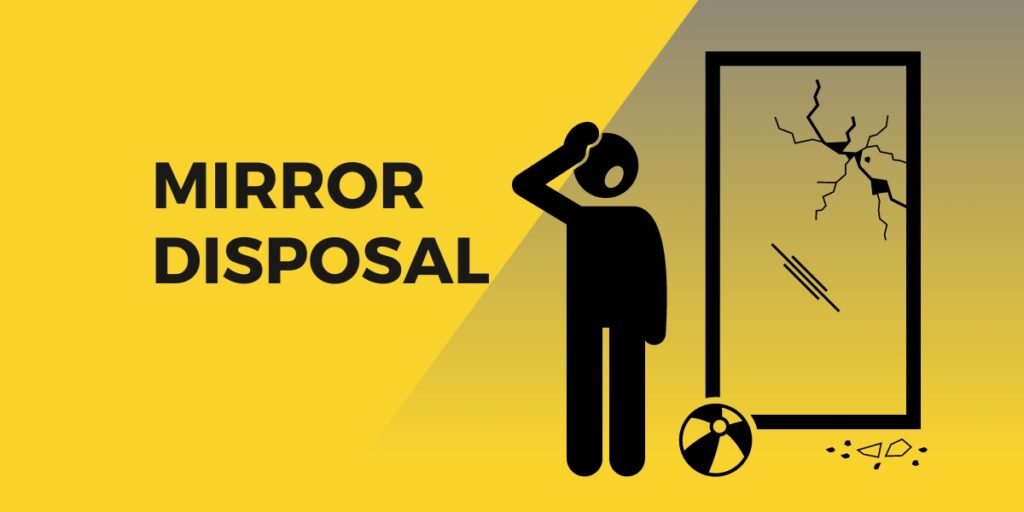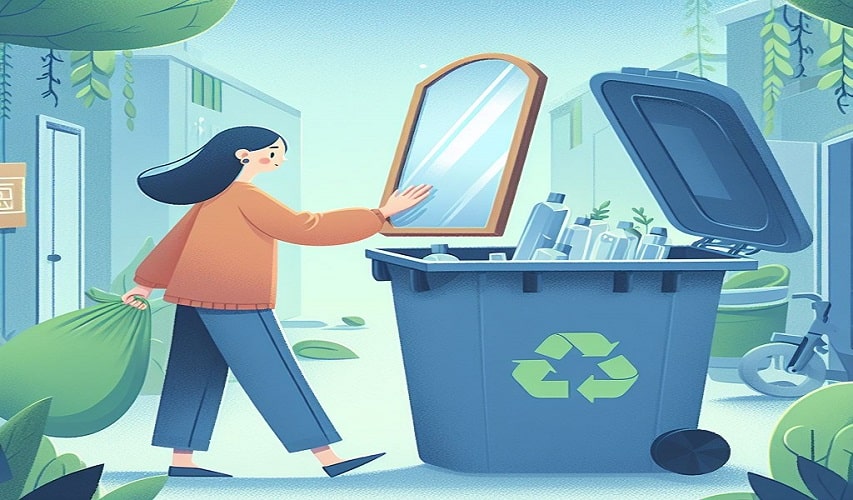How to Dispose of a Mirror
Dispose of mirrors by placing them in your regular trash, not in the recycling bin. Their reflective coating makes them unsuitable for standard recycling. For safe and eco-friendly disposal, follow these guidelines: handle broken mirrors carefully, choose appropriate disposal methods, and comply with local council regulations.
Larger mirrors which can’t fit into your weekly collection bin will need to be taken to the nearest resource recovery centre for disposal (fees may apply.
| Mirror Disposal Methods |
|---|
| - Regular trash for small mirrors - Resource recovery centres for large mirrors |
| Safety Precautions |
| - Wear protective gloves and shoes - Wrap broken pieces - Securely package and label broken mirrors |
| Environmental Considerations |
| - Explore alternative recycling options - Engage in community repurposing initiatives - Use environmentally friendly disposal methods |
| Community Resources |
| - Utilize local waste management services - Consult with your local council |
Table of Contents

Safety First: Handling Broken Mirrors
Dealing with broken mirrors requires careful handling to prevent injuries and ensure safe disposal. Since mirrors are made from glass, they can easily break into sharp pieces, posing a risk to safety. Here’s how you can handle and prepare broken mirrors for disposal in a secure manner.
Preparing for Safe Handling:
- Wear protective gloves and shoes to avoid cuts from sharp edges.
- If possible, wrap the broken mirror pieces in thick paper or bubble wrap.
Packaging Broken Mirrors:
- Securely package the wrapped mirror fragments in a sturdy cardboard box.
- Clearly label the box as containing broken glass to alert waste management personnel.
Disposal of Packaged Broken Mirrors:
- Place the boxed broken mirror in your regular waste bin, not the recycling bin.
- Ensure the box is securely closed to prevent any shards from escaping.
Considerations for Larger Broken Mirrors:
- Larger mirrors should be taken to your local Resource Recovery Centre.
- Ensure the mirror is safely secured in your vehicle during transport to prevent any movement that could cause further breakage.
By following these steps, you can effectively minimize the risk of injury and ensure that the broken mirror is disposed of safely and responsibly.
Recycling Options for Mirrors in Australia
While traditional recycling processes are not suitable for mirrors due to their specialized reflective coating, it’s important to explore alternative recycling options available in Australia. These alternatives not only help in reducing waste but also contribute to environmental sustainability.
-
Understanding the Recycling Challenge:
- Mirrors cannot be recycled with regular glass because of the coating that makes them reflective.
- This coating contaminates the recycling process, making it necessary to seek alternative disposal methods.
-
Exploring Specialized Recycling Centers:
- Some recycling centers or facilities may accept mirrors for specialized recycling or repurposing.
- Research local recycling centers or facilities like the Artarmon Resource Recovery Centre to determine if they accept mirrors.
-
Community Repurposing Initiatives:
- Local community groups or artists may accept mirrors for creative repurposing.
- Check community boards or online groups for opportunities to donate mirrors for art projects or other creative uses.
-
Consideration for Larger Mirrors:
- Larger mirrors might require special handling and transport to recycling or repurposing centers.
- Contact the facility in advance for specific guidelines and arrangements for the disposal of large mirrors.
By considering these alternative recycling options, Australians can ensure that their mirrors are disposed of in a manner that is both safe and environmentally conscious.
Alternative Disposal Methods
Apart from recycling, there are other ways to dispose of mirrors in Australia, especially when recycling is not an option. These methods ensure that mirrors are disposed of responsibly, reducing the potential harm to the environment and adhering to local waste management guidelines.
-
Regular Waste Collection:
- For smaller mirrors, the regular weekly waste collection service is a suitable option.
- Ensure that the mirror is securely packaged to prevent injury to waste management personnel.
-
Using Special Waste Collection Services:
- Some local councils offer special waste collection services for items like large mirrors.
- These services often require prior arrangement and may incur a fee.
-
Taking Mirrors to Local Waste Facilities:
- Facilities such as the Artarmon Resource Recovery Centre are equipped to handle larger mirrors.
- Check with the facility for any specific requirements or guidelines for mirror disposal.
-
Local Council Guidelines:
- Always refer to your local council’s guidelines for the most appropriate disposal method in your area.
- Councils like Willoughby City Council provide specific advice for disposing of items like mirrors.
By exploring these alternative disposal methods, Australians can dispose of their mirrors in a way that is safe, responsible, and in line with local regulations and environmental considerations.

Reducing Environmental Impact
Disposing of mirrors in an environmentally conscious manner is crucial in minimizing their impact on the environment. While mirrors themselves pose unique challenges for recycling, there are steps that can be taken to ensure that their disposal is as environmentally friendly as possible.
-
Understanding the Environmental Concerns:
- Mirrors, due to their reflective coating, cannot be processed with regular glass recycling, potentially leading to increased landfill waste.
- The production and disposal of mirrors involve emissions and resource use, making their environmental impact a significant concern.
-
Promoting Sustainable Disposal Practices:
- Opt for disposal methods that have the least environmental impact, such as using special waste collection services or taking mirrors to recovery centers.
- Encourage repurposing or donating mirrors to extend their life and reduce waste.
-
Involvement in Community Initiatives:
- Participate in or support local environmental initiatives aimed at reducing waste.
- Engage with community programs that promote recycling and sustainable living.
-
Advocacy for Better Recycling Technologies:
- Support research and development into recycling technologies that can handle complex materials like mirrors.
- Advocate for policies that encourage sustainable manufacturing and disposal practices.
By taking these steps, individuals can play a crucial role in reducing the environmental impact of mirror disposal, contributing to a more sustainable future.
Community Resources and Support
Leveraging community resources and support is a vital aspect of responsibly disposing of mirrors. These resources not only provide practical assistance but also foster a sense of community involvement in environmental stewardship.
-
Local Waste Management Services:
- Utilize local council waste management services for guidance on mirror disposal.
- Services like those offered by the Willoughby City Council provide specific instructions tailored to local needs.
-
Resource Recovery Centres:
- Facilities like the Artarmon Resource Recovery Centre play a crucial role in handling items that require special disposal methods.
- These centers often provide additional information and support for disposing of non-recyclable items like mirrors.
-
Community Education and Awareness:
- Participate in local workshops or information sessions about waste management and recycling.
- These programs help in understanding the importance of proper disposal practices and their environmental impact.
-
Engaging with Online Communities and Forums:
- Online platforms can be valuable resources for sharing information and tips on mirror disposal.
- Engage with local community groups or forums for advice and support.
-
Seeking Expert Advice:
- Consult with environmental experts or local council representatives for the best disposal practices.
- Their expertise can provide valuable insights into sustainable disposal methods.
By engaging with these community resources and support systems, you can ensure that their mirrors are disposed of in an environmentally responsible and safe manner.
Find Your Local Recycling Centre
Click links below to find recovery centres in your state
Considering Mirror Replacement?
After safely disposing of your old mirror, you might be thinking about a replacement. Whether you’re renovating your space or simply looking for a fresh look, considering a custom mirror can be a great choice. Custom mirrors not only enhance the aesthetics of your home or business but also offer the flexibility to match your specific design needs. To explore various styles and customizations that can transform your space, learn more about our Mirror Replacement options.

Khalil is the owner of Splendid Window Glass Repairs and has over 8 years experience as a glazier specialising in window glass repair, replacement and installations. Khalil takes great pride in his work and prides himself on providing an excellent service to all of his customers, no matter how big or small the job may be.
Looking for a hassle-free solution for your mirror needs? Whether it’s expert installation or safe replacement, our professional Mirror Installation and Replacement Services have got you covered. With our team of skilled professionals, you can ensure that your mirrors are handled with care and precision. Click here to learn more and schedule your service today!
